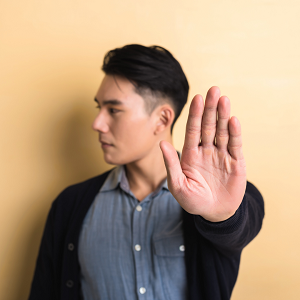What are boundaries?
Boundaries are simply dividing lines, physical or metaphorical dividers that say “over here” is what I am comfortable with, and over there is not”.
Boundaries mark the space where we end and others begin. They allow us to separate who we are from others and protect ourselves from being used or violated or overrun by other people’s thoughts, actions, and emotions.
When we lack boundaries completely, we enmesh with others. Having no boundaries means we are unaware of where we begin and others end. Generally, people who lack boundaries are afraid of being alone or disliked by others.
In contrast, boundaries that are too rigid create distance between us and other people. People with rigid boundaries are often afraid of feeling vulnerable or being taken advantage of.
But healthy boundaries are the gateway to true intimacy. When we have healthy boundaries with ourselves and others, we appreciate the needs and perspectives of other people while maintaining our own independence. Healthy boundaries make space for us to speak our minds directly and with kindness, and allow for simultaneous autonomy and connection.
What is it so difficult to set healthy boundaries?
Most of us have a difficult time setting boundaries because we are afraid of what others will think. We are worried our friends won’t like us anymore or that our family will get upset. In other words, we don’t set boundaries because we are concerned about people-pleasing, except that the people we are pleasing are not ourselves.
The other two things that make it difficult to set healthy boundaries are, 1) not knowing who we are or what we want and need from others, and 2) not knowing or understanding what boundaries are or how to set them.
How do you set them?
Setting boundaries means putting yourself above others and this begins with a journey of self-discovery. In order to set boundaries, you have to know what your boundaries are.
Begin by identifying your non-negotiables. Check-in with yourself regularly to find out what you want and how you feel. Practice saying “no” and “maybe” and “I’ll get back to you on that”.
Two examples of healthy boundaries are:
-
“It is important to me that you are on time when we plan to meet. I will wait for ten minutes and if you aren’t there I am going to have to leave. My time is important to me.”
-
“I have agreed to stay at this event for three hours tonight, if you want to stay longer I suggest we take separate cars.”
The most important thing is to trust yourself and to acknowledge that the relationship you have with yourself is more important than the relationships you have with others. In extreme cases, the result of setting healthy boundaries may mean you remove yourself from people who continuously disregard your needs.
Family boundaries.
Everybody has a right to establish and maintain boundaries – with friends, with lovers, with family. Too often, the need for boundaries is illuminated over the holidays.
Remember, you have a right to dignity and respect from others, including your family. You have a right to physical space and safety, a right to your beliefs and opinions, and a right to say “yes” or “no” as needed. Others have the same rights as well, so this holiday season, be mindful of treating others how you would like to be treated.
Ways to establish boundaries this holiday season.
-
Over communicate about gift price points with your partner, friends, and family.
-
Under commit to events. Attending too many will make it impossible to enjoy any of them.
-
Decide if you will travel and then stay true to your decision. If you have small children, ask others to come to you.
-
Practice saying “no”. Remember you can’t please everybody.
-
Suggest a potluck so you don’t have to cook the entire meal.
-
Replace questions with statements. For example, “You don’t really want to go out, do you?” becomes, “I don’t want to go out this evening.”
-
Be vigilant of your “no’s”. These may include conversations about your eating or drinking habits, family gossip, politics, or anything else that makes you uncomfortable.
Anyone can learn to set healthy boundaries.
Setting healthy boundaries isn’t easy. It takes practice, you’ll make mistakes, and you’ll ruffle some feathers. You may be called selfish, rude, or mean. It will be difficult. Learning to establish boundaries may require the help of a therapist or a support group because people-pleasing and codependency run rampant in our culture.
But know this, anyone can learn to set healthy boundaries and healthy boundaries will lead to greater self-confidence, healthier relationships, and overall, a better quality of life. Boundaries are the gateway to more happiness in your life and less resentment toward others.
Our therapists at The Relationship Therapy Center understand that many people suffer in relationships because they don’t know what they don’t know. At the RTC, we are passionate about helping our clients identify what they want to create and giving them the support and guidance to do so.
Other Services offered at The Relationship Therapy Center in California:
In addition to individual therapy, Our Sacramento area counseling clinics located in Roseville and Fair Oaks, CA are pleased to offer a variety of mental health services. We will discuss the importance of self-care and emotional support to help you cope and to discover ways to find healthy ways of dealing with stress.
Individual therapy can be beneficial, with the right therapist. Our compassionate therapists are trained to walk you through the process and help you find healing and peace. Please contact our therapy office to learn more about the many ways we can help you and your loved ones heal, grow, and love healthy.



